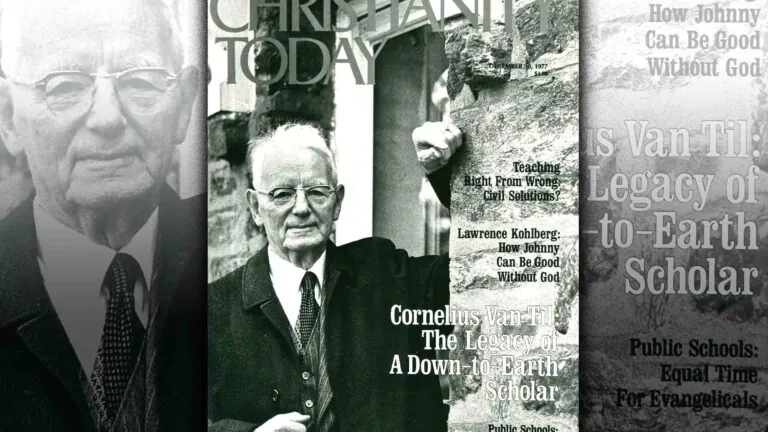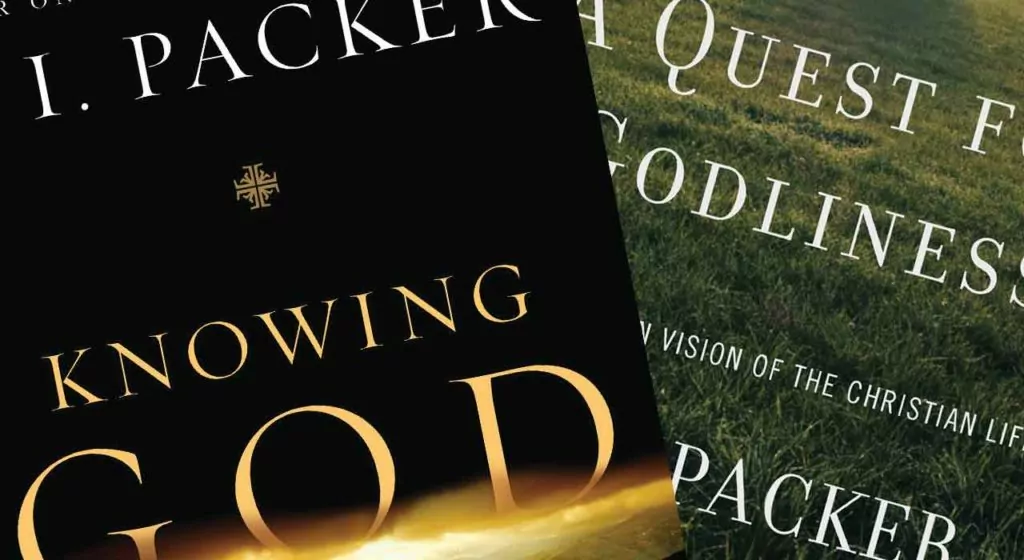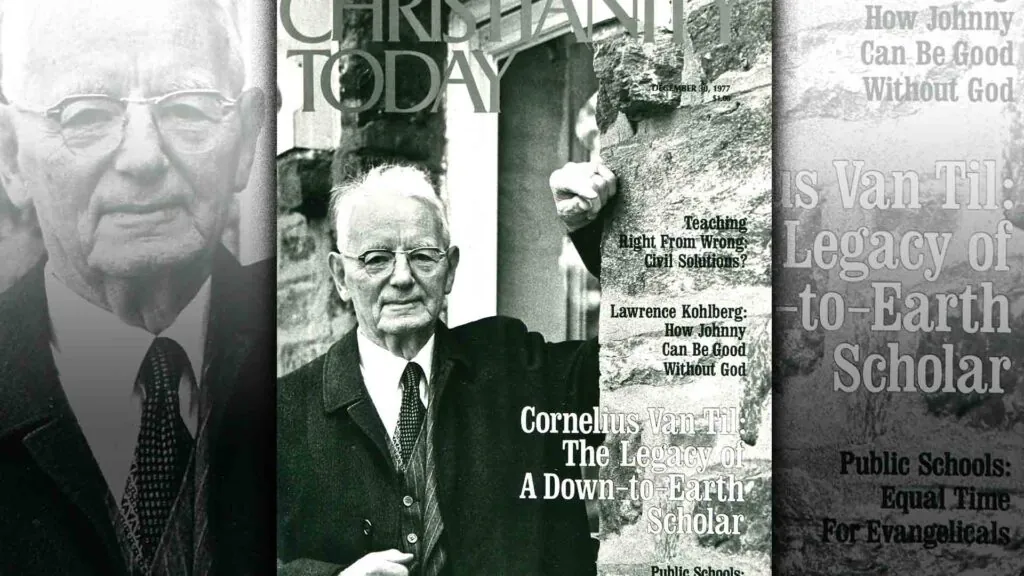Cornelius Van Til may not have seemed a likely candidate to accomplish a “Reformation of Christian Apologetics,” but God is in the habit of utilizing unlikely candidates to mount great victories for His kingdom. Van Til “wanted to be a farmer…. Instead he became one of the foremost Christian apologists of our time,” to use the words of David Kucharsky in Christianity Today (Dec. 30, 1977, p. 18).
Early life
Van Til was born May 3, 1895, in Grootegast, Holland, as the sixth of eight children to a devout dairyman-farmer. At the age of ten his family sailed to America and settled in Indiana. Cornelius enjoyed the soil and animals, but his evident intellectual strengths got him sent to Calvin Preparatory School in 1914.
He worked his way through as a part-time janitor and wholly loved the study of philosophy. By the time he enrolled in Calvin Seminary in 1921, he was already familiar with the works of Abraham Kuyper and Herman Bavinck and had added a knowledge of Hebrew, Greek, and Latin to his Dutch and English! He studied systematic theology under Louis Berkhof and Christian philosophy under W. H. Jellema. During his first year of seminary J. Gresham Machen – the man who stood head and shoulders above others as presenting a Christian faith worthy of scholarly defense – published The Origin of Paul’s Religion.
The next year Van Til transferred to Princeton where he could study with Machen as well as at the philosophy department of Princeton University (under the Scottish personalist, A. A. Bowman). At the seminary Van Til managed the student dining club, and lived on the same floor in Alexander Hall with “Das” Machen, who was busy publishing numerous apologetical studies (including his monumental Christianity and Liberalism [1923]). Van Til’s seminary adviser, C. W. Hodge Jr., was a grandson of Charles Hodge and the successor to B. B. Warfield. Van Til profited from the solid Biblical instruction of men like Hodge, Robert Dick Wilson, William Park Armstrong, and Oswald T. Allis, but the professor closest to his heart was Geerhardus Vos, the respected Dutch scholar who championed the method of “Biblical theology.”
Van Til won the prize-winning student papers for both 1923 (on evil and theodicy) and 1924 (on the will and its theological relations). The seminary granted him a Th.M. in systematic theology in 1925, after which he married his long-time sweetheart, Rena Klooster. At the university Van Til’s prowess in metaphysical analysis and mastery of Hegel’s philosophy had gained high praise from A. A. Bowman, who offered him a graduate fellowship.
In 1927 the university granted him the Ph.D. in philosophy for a dissertation on “God and the Absolute.” In the same year his first published piece (a review of A. N. Whitehead’s Religion in the Making) clearly exhibited the salient lines of presuppositional analysis:
a) locating an opponent’s crucial presuppositions
b) criticizing the autonomous attitude which arises from a failure to honor the Creator-creature distinction
c) exposing the internal and destructive philosophical tensions which attend autonomy, and then
d) setting forth the only viable alternative, Biblical Christianity.
When J. Gresham Machen declined the chair of apologetics at Princeton Seminary, deciding to remain in the New Testament department, the Board of the seminary was encouraged by William Brenton Greene (1854-1928), the retired professor of apologetics, to invite Van Til to lecture in the department for the 1928-1929 academic year. Following the reception of his doctorate and his first visit back to the Netherlands (1927), Van Til had accepted the pastorate of the Christian Reformed Church in Spring Lake, Michigan. Although installed for only a year, he took a leave of absence from the congregation and taught apologetics at Princeton, impressing everyone so favorably (even though the youngest instructor there) that at the end of only one year the Board elected him to assume the Stuart Chair of apologetics and ethics.
The decline of PCUSA and the beginning of the OPC
However, within weeks the General Assembly of the Presbyterian Church in the U.S.A. reorganized Princeton Seminary in such a way that control of the once conservative bastion of Reformed orthodoxy was turned over to men who desired to see many different viewpoints represented at Princeton and who favored a “broad church.” Machen resigned and immediately started work to establish Westminster Theological Seminary in Philadelphia. Van Til likewise resigned and returned to Michigan.
In the mean time, Machen handpicked Van Til to teach apologetics in the new seminary, even traveling with Ned B. Stonehouse to Michigan in August to plead for Van Til’s acceptance of the position – after a previous visit from O. T. Allis had not secured it. After declining at first, Van Til took up teaching duties at Westminster Seminary in the fall of 1929, where he continued in that ministry until retiring more than forty years later. When Machen was unjustly forced out of the Presbyterian Church in the U.S.A. in 1936, Van Til supported him in the founding of the Orthodox Presbyterian Church, where he came to have a decided influence for years to come, both as a scholar and as a powerful pulpit preacher.
Presuppositional publishing
From the outset of his teaching career Van Til sought to develop a distinctively, consistently Christian philosophical outlook. He wanted to see everything in terms of a Biblical world-and-life-view. The first major syllabus produced by Van Til at Westminster Seminary, (now titled A Survey of Christian Epistemology) came out in 1933. In it he traced through history various epistemological positions, noting the bearing of metaphysical convictions upon them, and advanced the necessity of a transcendental, presuppositional method of argumentation.
He insisted that Christians must reason with unbelievers, seeking to reduce the non-Christian worldview (whatever form it takes) to absurdity, by exposing it to be epistemologically and morally self-contradictory. Van Til’s insight, a brilliant and apologetically powerful one, was that antitheism actually presupposes theism. To reason at all, the unbeliever must operate on assumptions which actually contradict his espoused presuppositions – assumptions which comport only with the Christian worldview.
Van Til’s presuppositional approach has been a powerful impetus for reform in Christian thinking. Outwardly, it directs a transcendental challenge to all philosophies which fall short of a Biblical theory of knowledge, demonstrating that their worldviews do not provide the philosophical preconditions needed for the intelligible use of logic, science, or ethics. Inwardly, it calls for self-examination by Christian scholars and apologists to see if their own theories of knowledge have been self-consciously developed in subordination to the word of God which they wish to vindicate or apply. It has likewise cut a wide swath through a large number of relevant areas of interest, requiring that every area of life be governed by the inscripturated word of God.
Conclusion
Those who knew Dr. Van Til personally will testify that he was not only a man of principle and conviction, a towering intellectual, but equally a man of warmth, humor, and compassion. On April 17, 1987, he joined all the saints who from their labors rest.
This article was first published in the May, 1995 issue of Penpoint (Vol. VI:5) and is reprinted with permission of Covenant Media Foundation, which hosts and sells many other Dr. Bahnsen resources on their website www.cmfnow.com. It appeared in the November 2014 issue.












